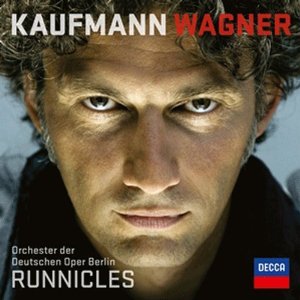|
|
|
|
|
|
|
|
|
The Examiner, February 11, 2013 |
| By: Stephen Smoliar |
|
|
|
Celebrate the Wagner bicentennial with Jonas Kaufmann on Decca |
|
 Celebrate
the Wagner bicentennial with Jonas Kaufmann on Decca Celebrate
the Wagner bicentennial with Jonas Kaufmann on Decca
In celebration of
the 200th anniversary year of the birth of Richard Wagner, tomorrow Decca
will release their fifth solo album of Jonas Kaufmann, acclaimed by many as
the world’s leading Wagner tenor. The all-Wagner recording will present
arias and extended scenes of Kaufmann in six major Wagner roles. In the
order of the tracks, these are:
Siegmund in Die Walküre
Siegfried
in Siegfried
Cola Rienzi in Rienzi
Tannhäuser in Tannhäuser
Walther
von Stolzing in Die Meistersinger von Nürnberg
Lohengrin in Lohengrin
These are followed by the five songs known as the Wesendonck Lieder,
settings of poems composed while Wagner was working on Tristan und Isolde
(and possibly pursuing an affair with the poems’ author). Wagner wrote these
for female voice and piano but then orchestrated the accompaniment for
chamber orchestra resources. They were performed in that form beneath
Wesendonck’s window for her birthday on December 23, 1857. This new release
offers a rare recording of the full cycle by a tenor (although tenors from
Lauritz Melchior to Placido Domingo have recorded individual selections).
However, I do not wish to give the impression that this “complete
Wesendonck” is the primary virtue of the recording. What is equally
impressive is how each of the first six selections shows how Wagner
approached a different character type. One the one hand we have the naïve
Siegfried, who has yet to discover fear, wandering through the forest in
search of the dragon Fafner. At the other extreme we have Tannhäuser
returning from his pilgrimage to Rome, convinced of the eternal damnation
that awaits him and seduced once more by the lure of Venusberg. Across the
breadth of this spectrum, Kaufmann shapes his voice around each individual
personality, always expertly reinforced by the Orchester der Deutschen Oper
Berlin under the baton of Donald Runnicles, a leading figure in the Wagner
repertoire in his own right. (I make this claim on the basis of having
personally experienced his conducting the Ring cycle twice, along with a
fair share of the rest of the Wagner canon).
Thus, while it is
virtually impossible to summarize the full extent of Wagner’s achievements
on a single compact disc, this particular distillation of six leading tenor
roles complemented by the Wesendonck Lieder provides a remarkably
comprehensive view of the composer, whether one is a “perfect Wagnerite” or
a novice seeking out a first taste of Wagner’s consummate skill.
|
|
|
|
|
|
|
|
|
|
|
|
|
|
|
|
|
|
|